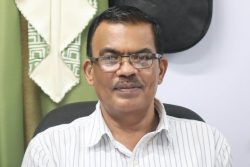The news that the government will be training 3,000 Guyanese to weld through a new programme by the School of the Nations in collaboration with the Guyana Online Academy of Learning (GOAL) is a positive development.
According to the Department of Public Infor-mation (DPI) the programme has been premised on the growing need for welders in the oil & gas sector. This obviously feeds positively into two of the government’s commitments: the creation of 50,000 jobs in five years and the need for the blooming of local content in the work plans of ExxonMobil’s major contractors.
The registrants will come from the various regions across the country, with the exception of region one, President Ali explained at the launch. He said that following this initial phase, the government plans to introduce the programme in each of the ten administrative regions to expand its reach.
“We are committed to training at least 3,000 Guyanese across our country in this programme alone. We are committed to ensuring that you get trained, you get the certification, and you are industry-ready,” the President told the participants.
At the end of the training, graduates will be conferred with a City and Guilds Certificate.
The President emphasized that the aim is to ensure that at the end of the programme, each participant is gainfully employed. “This is what the One Guyana concept is about, bringing opportunities for one another, lifting each other together, and opening up doors for each other.”
Several oil and gas companies operating here will observe the training sessions to engage with participants and explore employment opportunities, DPI said.
Jobs are indeed the key objective and while welding is not high tech it can provide a far improved prospect of earning a living. One presumes therefore that there are indicative local content plans from Exxon’s subcontractors citing the need for these numbers or evidence that local industry is losing welders in these amounts to the oil and gas sector.
Whichever way the demand for welders is flowing, a vital accompaniment to the program-me announced by the government will be tracing to determine what becomes of the welders at the end of the training period and if employed, what their work experience is and whether their engagement lasts. This is crucially important as the country cannot afford – no matter the amount of oil revenues available – to pursue costly training which doesn’t deliver well-paying jobs and leaves the graduates in limbo and frustration.
Interestingly, in April this year, the Ministry of Education announced that it had embarked on aligning Technical and Vocational Education Training (TVET) with current and future labour market demands at both secondary and post-secondary education levels.
The ministry said in a release that a critical aspect of this project is a tracer study, undertaken in partnership with the Council for TVET. The study aims to evaluate the employment status and assess the quality of education received by TVET graduates, twelve months after their programme’s completion.
The release said that this evaluation will encompass graduates from the vocational streams of secondary education, including those from the Secondary Competency Certificate Programme and the Caribbean Vocational Qualification programme, as well as graduates from public post-secondary TVET institutions.
To facilitate this study, the Ministry has engaged Groupe Cayambe, a consultancy firm. This is exactly the type of scrutiny the welding programme should be subjected to in addition to the question of whether any of the trained welders eventually migrate.
There is an aspect of the announcement of this programme that is troubling. At its launching the organisers identified the School of the Nations and the state’s much-vaunted GOAL programme for online training with its connection to universities overseas offering online training. There was however no mention of the Ministry of Education’s own TVET into which a lot of money has been poured or the Ministry of Labour’s Board of Industrial Training (BIT)
Both TVET and BIT have been fully engaged in a range of training in technical and vocational areas including welding. Why weren’t they the vehicles for the training of these 3,000 welders? We cannot have duplication of services and facilities simply because we have the resources. Both TVET which has expensive facilities and BIT which runs regular courses should have been integral aspects of this programme. There is still time for this.
Indeed, in March this year, it was announced that the oil companies, ExxonMobil, Hess and CNOOC were working along with the Ministry of Educa-tion’s TVET under the Greater Guyana Initiative (GGI). Phase I, which commenced in 2019 at the Linden and New Amsterdam Technical Institutes, included infrastructure improvements, renovations and upgrades to the electrical and welding workshops.
According to a release from GGI, curriculum packages were also developed in alignment with the requirements from the Caribbean Association of National Training Authorities (CANTA), and National Centre for Construction Education and Research (NCCER), along with the roll-out of a Basic Industrial Safety Training (BIST) Programme – across all TVET locations.
That sounds as if these TVET centres are quite capable of delivering the training that is needed. According to the release, the project was extended to include the Leonora and Mahaicony Technical and Vocational Training Centres and this encompassed enhancing the Electrical and Welding Programmes while introducing safety programmes and professional development for instructors and students. Additionally, the institutes were to benefit from upgrades to existing infrastructure and the provision of new equipment and training materials.
Consolidation of these TVET and BIT programmes with the new welding scheme must be pursued.
In February of 2023, Stabroek News reported on a BIT graduate, Raphael Joseph who according to a release from the BIT said that he had a new outlook on life after taking advantage of the programmes offered by the institution.
A BIT release reported Mr Joseph as saying that his life was permanently changed after a chance contact with one of the BIT officers who was on a mission to encourage persons to take advantage of the board’s training programmes.
The Region Three resident stated that the meeting convinced him to consider the numerous opportunities that would be accessible to him once he completed the programme, the release said. This included the possibility of advancing his position at Halliburton LMP. Taking the plunge he opted to enrol in the agency’s Welding and Fabrication programme.
According to the release, Mr Joseph reported that “his experience was nothing short of extraordinary” and praised the outstanding job done by the lecturer who he said taught each student at their own pace. This, he said, “inspired him to work harder to attain his goals and make his lecturer proud.”
Mr Joseph said that he planned to become an entrepreneur and establish a welding company, through which he felt he could contribute to the country’s development by bidding on government projects. It would be interesting to know how it turned out for Mr Joseph and what this could mean for this new programme being embarked upon.






